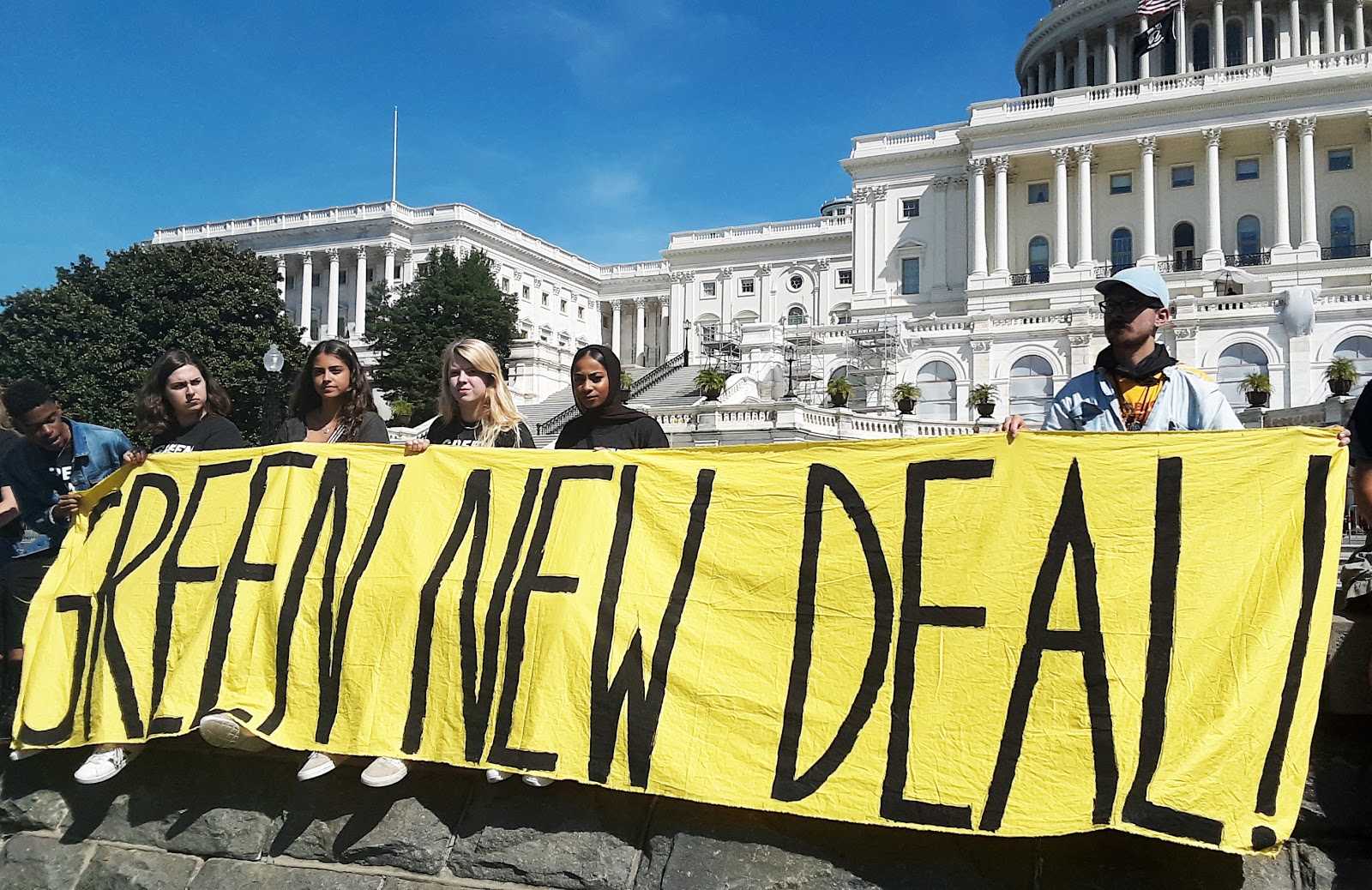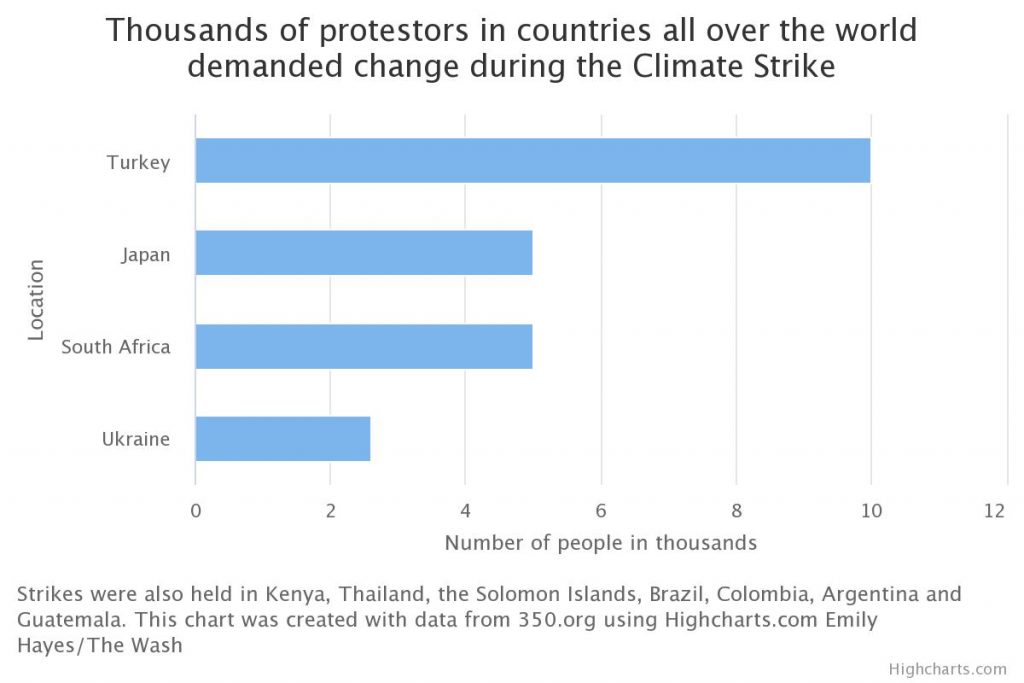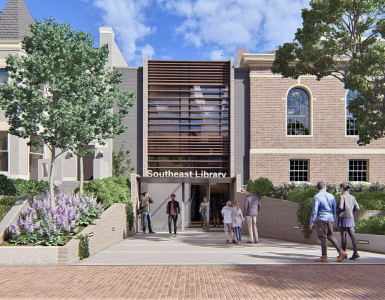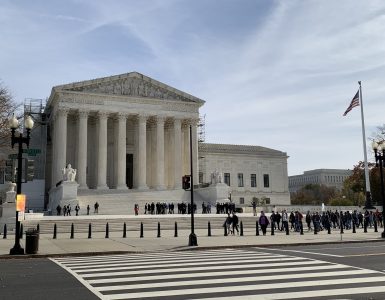Greta Thunberg mobilized thousands of students in Washington, D.C., along with millions of students around the world, to demand action on climate change instead of going to school on Friday.
The strike happened days before world leaders met for the UN Climate Summit in New York, where Thunberg gave an emotional speech. She pleaded with policymakers to change their priorities from “fairytales of economic growth” to the fact that “we are in the beginning of a mass extinction.”
Abbie La Porta, a member of the student-led environmental justice organization Zero Hour, said there is a lot of significance in how Thunberg sailed to the United States for her UN appearance instead of flying on an airplane, to cut the carbon emissions of her trip.
“It shows just how dependent our society has become on fossil fuels,” La Porta said.
Students marching on Capitol Hill also have the unique opportunity to influence lawmakers at the national level.

Jonah Gottlieb, 17, executive director of the National Children’s Campaign, traveled from Northern California to Washington, D.C., for the global Climate Strike.
His organization is one of the sponsors, and Gottlieb himself spent the past week testifying in front of Congress and meeting with lawmakers to present the strikers’ demands.
“I should be at home working on my college applications right now,” Gottlieb said. But after wildfires raced across his home state of California, destroying communities, Gottlieb said he decided to do something bigger.
Student leaders from organizations across the country met in person to discuss the transition to a sustainable and equitable economy at a conference in Idaho at the end of July. They resolved to bring all the groups together in some way for a stronger national influence.
For these students, there is no time to lose.
“We need to stop playing into the fossil fuel industry narrative that we have time,” Gottlieb said. “The climate crisis,” he testified earlier this week, “is already happening now.”

Jenna Dawson, 17, skipped class at her high school in Maryland because climate change is an issue that does not discriminate along political party lines, and so there should be swift bipartisan action, she said.
“I don’t want to be the generation that failed, I want to be the generation that succeeded,” Dawson said.
Kelsey Juliana, 23, one of the young people suing the federal government over the climate crisis, expressed the same sense of urgency.
“They want us to just sit in school and learn for a future that might not exist,” she said to the crowd.
Some representatives from Congress attended the strike, including Rep. Jim McGovern, D-Mass., Rep. Raúl Grijalva, D-Ariz., Rep. Kathy Castor, D-Fla., Rep. John Garamendi, D-Calif., and Rep. Jerry Nadler, D-N.Y. But Gottlieb said most members of Congress don’t actually listen to what they are demanding and why they are demanding it.
“We understand they are scared of losing their seats and their money, but we are scared of losing our lives,” Gottlieb said.
There are approximately 74 million people under the age of 18 in the United States, according to the last official census in 2010. Since they can’t vote, striking is a way to make their voice heard when they will be the ones affected the most by climate change, Gottlieb said.
Polling done by the National Children’s Campaign shows that the majority of Americans support children’s initiatives. A campaign of thousands of students telling their parents, teachers and coaches to vote to protect the planet, therefore, could work, Gottlieb said.

Demands of the Climate Strike
The strikers have a clear set of five demands that they are proposing to lawmakers, including:
- Pass the Green New Deal, legislation introduced by Sen. Ed Markey, D-Mass., and Rep. Alexandria Ocasio-Cortez, D-N.Y.
- Restore and protect biodiversity.
- Implement sustainable agriculture.
- Respect indigenous peoples and lands.
- Pursue environmental justice by advocating for communities on the frontlines of poverty and pollution.

Climate Change and Race
The last two demands were addressed in depth at the Climate Strike in front of the U.S. Capitol building.

The climate crisis is different from every other crisis because it affects all people, regardless of skin color or class, said Wendy Gao, 17, at the strike.
However, it affects low-income communities and people of color first, said Khadija Khokhar, an organizer for Fridays For Future, Thunberg’s strike organization.
“In D.C., for example, all of our toxic waste and trash travels across the Anacostia River into landfills that are systematically placed in communities of color,” Khokhar said.
Tokata Iron Eyes, 16, is from the Standing Rock Nation in North Dakota and has been advocating for policy actions to halt climate change since she was nine years old.
“And our ancestors have been fighting for this since before we knew what the climate crisis was,” Iron Eyes said.
The land that the Capitol sits on used to be native land, and the genocide of American Indians is tied to greed for natural resources, Iron Eyes said. The issue of climate change is also a race issue and a feminism issue, Iron Eyes said.

Jerome Foster II, 16, founder and executive director of One Million of Us and a Washington, D.C., native, urged everyone to strike on Fridays to make sure that the momentum from the global Climate Strike doesn’t die, and that real change will come from their actions.
“After this, you can’t just go back to your schools. We will pause the earth every single week,” he said to the crowd.
The U.S. federal government continues to roll back environmental protections like the Clean Water Act. But young people involved in the climate strike wait to see if other world leaders involved in the UN Climate Summit will take action on their global demands, and ramp up their plans to address climate change.
High school students Priscilla Wilson-Gay, 17, and Jenna Dawson, 17, explain why they skipped school to attend the Climate Strike at the U.S. Capitol.#ClimateChange #ClimateStrike #ClimateAction #FridaysForFuture pic.twitter.com/FYoxv5h546
— The Wash (@authewash) September 20, 2019















Add comment